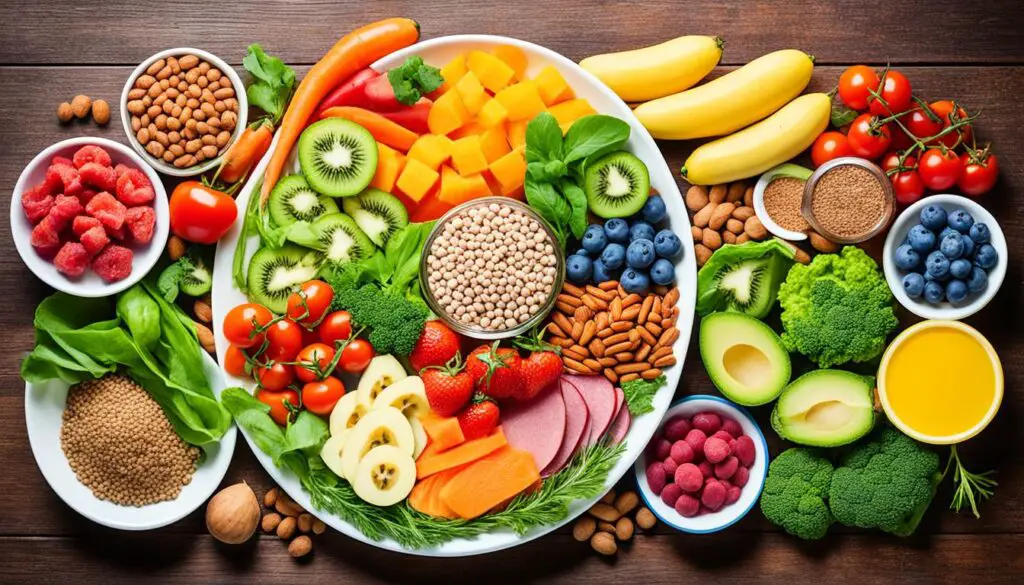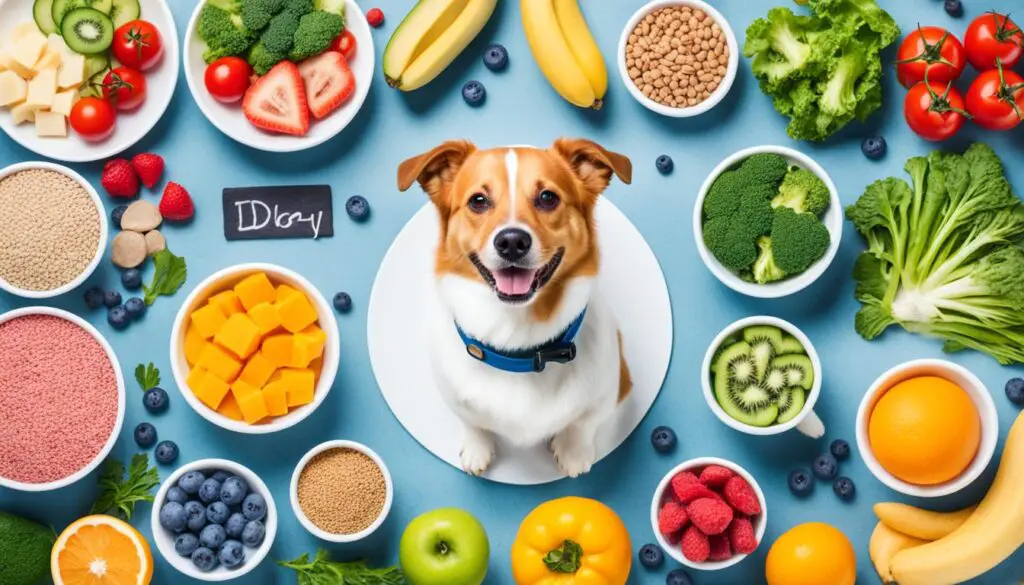Feeding your pet the right food is so important. A good diet helps them stay healthy and happy. Make sure to learn about pet food and give your pet what they need.
A good diet for pets includes lots of necessary nutrients. Pets need things like protein, carbs, fats, vitamins, and minerals. These help them stay active and avoid sickness. For instance, they need protein for their bodies to grow and to fix tissues. Carbs give them energy, fats keep their coat shiny, and vitamins and minerals keep them overall healthy.
Be mindful when picking pet food. Go for quality foods that use real ingredients. Try to avoid foods with artificial stuff or things that don’t add nutritional value. It’s also crucial to think about what your specific pet needs. This can be based on their age, what type of pet they are, their size, and health conditions. A vet can help you figure out the best food for your pet.
Key Takeaways:
- A well-balanced diet is essential for your pet’s overall health and well-being.
- Key nutrients like high-quality protein, carbohydrates, fats, vitamins, and minerals are necessary for their vitality.
- Choose pet food with real, whole food ingredients and avoid artificial additives or fillers.
- Consider your pet’s individual needs and consult with your veterinarian for tailored recommendations.
- Providing a well-balanced diet can help prevent health problems and promote a long and happy life for your pet.
Importance of Nutritional Balance for Dogs
Dogs need certain nutrients for their health and happiness, just like humans do. Although they are carnivores, they eat both plant and animal foods. This helps them get all the essential nutrients they need.
Protein is a key part of a dog’s diet. It helps build cells, keep them in good shape, and fix them when needed. Dogs need quality meat in their diet for strong muscles, healthy tissues, and a strong immune system.
Dogs also need fresh fruits and veggies in their diet. These foods are full of vitamins, minerals, and antioxidants. They boost the immune system, keep digestion running smoothly, and help prevent diseases.
Healthy fats are important for dogs too. They give dogs energy and supply vital fatty acids. These acids keep their coat shiny, brain working well, and help them absorb nutrients. Adding healthy fats, like fish oil, is good for their health.
Feeding dogs the right food is vital for their health. Their diet might need to change based on their age, how active they are, and their health. It’s important to talk to a vet to make a feeding plan that’s just right for them.
Benefits of a Balanced Diet for Dogs:
- Supports muscle development and tissue repair
- Promotes healthy digestion and immune function
- Aids in nutrient absorption
- Contributes to a shiny coat
- Provides energy for daily activities
- Supports brain function
Feeding our dogs a well-balanced diet is crucial for their overall health and well-being. By meeting their specific nutritional requirements through a combination of high-quality protein, fresh fruits and vegetables, and healthy fats, we can ensure that our furry friends lead happy, healthy lives.
The Role of Fresh Ingredients in Meeting Dog’s Nutritional Needs
Fresh ingredients are key to a dog’s health. They need high-quality meats, fresh fruits and vegetables, and healthy fats. These foods keep them strong and happy.
A high-quality meat source gives dogs the essential protein they need. Protein helps with tissue repair, growth, and keeping the immune system strong. It keeps their muscles and organs in good shape too.
Fresh fruits and vegetables are packed with vitamins, minerals, and phytonutrients. They help dogs stay healthy by supporting a strong immune system and good digestion. They are key to a dog’s everyday health.
Along with protein and veggies, healthy fats are crucial. They give dogs energy, help them absorb nutrients, and make their coats shiny. Adding healthy fats to their diet means better health.
Using fresh ingredients makes sure dogs get the most nutrients. It also means they eat less, which prevents weight gain. A diet made for your dog’s specific needs is best. A vet can help plan the perfect diet.
FAQ
Why is a well-balanced diet important for my pet?
A well-balanced diet keeps your pet healthy and full of energy. It has all the nutrients they need. This helps prevent health problems.
What are the key nutrients in a well-balanced diet for pets?
A balanced diet for pets includes protein, carbs, fats, vitamins, and minerals. These nutrients are crucial.
Why is protein essential in a pet’s diet?
Protein helps pets grow and repairs their tissues. It’s a key part of their diet.
What is the role of carbohydrates in a pet’s diet?
Carbohydrates give energy and fiber to pets. They are important for their diet.
How do fats contribute to a pet’s overall health?
Fats help pets inside and out. They support bodily functions and make pets’ skin and coat healthy.
Why are vitamins and minerals important in a pet’s diet?
Vitamins and minerals support pets’ overall health. They are essential for their well-being.
How do I select the right pet food for my pet?
Choose pet food with real, whole ingredients. Make sure it fits your pet’s special needs. Talk to your vet for advice.
Can dogs be considered omnivores?
Yes, dogs can eat plants and animals. They have evolved to enjoy an omnivorous diet.
What are the nutritional requirements for dogs?
Dogs need a mix of animal and plant foods. They require protein, fresh produce, and healthy fats.
Why is protein important in a dog’s diet?
Protein keeps a dog’s cells healthy. It’s necessary for their growth and body repair.
What do fresh ingredients contribute to a dog’s diet?
Fresh ingredients give dogs important nutrients. These include proteins, vitamins, minerals, and more. This helps keep them healthy.
How do healthy fats benefit a dog’s diet?
Healthy fats give dogs energy. They help dogs absorb nutrients and maintain a shiny coat.
How should I create an individualized diet for my dog?
Think about your dog’s activity level and health needs. A vet can help choose the right diet for them.


